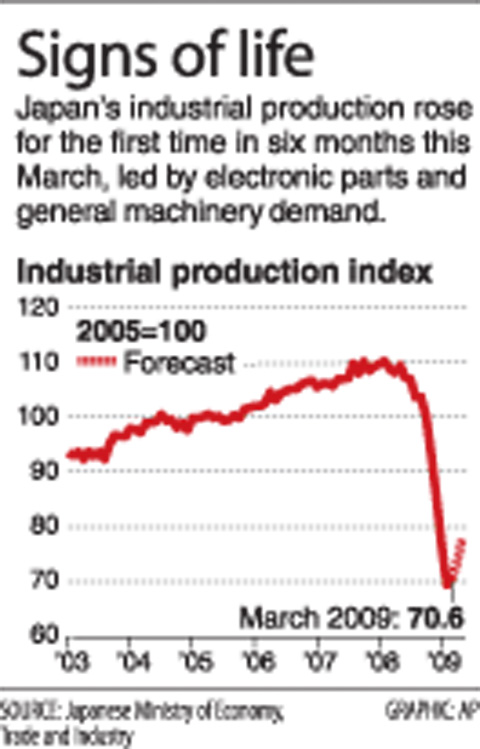Asian currencies rose against the dollar for a third week as signs a global recession is easing prompt investors to favor riskier assets, helping emerging markets draw funds.
South Korea’s won and Indonesia’s rupiah led the advance on optimism the region’s exports will rebound after Japan reported industrial output grew for the first time in six months and a Chinese gauge of manufacturing climbed for a second month.
The New Taiwan dollar jumped the most in six months on Thursday after Chinese companies were allowed to invest in Taiwan for the first time since 1949.

The NT dollar rose 1.3 percent this week to close at NT$33.233 against the greenback. The currency appreciated 2.1 percent last month, following an advance of 3.1 percent in March.
The won surged 4.7 percent this week to close at 1,282.95 per dollar in Seoul, according to data compiled by Bloomberg. The rupiah climbed 2.1 percent to 10,610.
All regional markets except Indonesia were closed on Friday for the Labor Day holiday. There was no trading in Mumbai on Thursday as well for elections.
The yen traded at 99.17 a dollar after dropping to a two-week low of 99.58 on Friday. It declined to 132.07 per euro on Friday, the lowest since April 14.
The ringgit strengthened 0.8 percent this week to 3.5585 per dollar.
Elsewhere, the Philippine peso gained 0.1 percent this week to 48.360 versus the greenback and the Thai baht rose 0.3 percent to 35.30. China’s yuan was little changed at 6.8230 versus 6.8273 last Friday.
The US dollar dropped as signs of recovery in manufacturing in China and the US sapped demand for the currencies as a refuge.
Australia’s dollar rose for a ninth week against the greenback.
The euro rose 0.9 percent to ¥131.74 at 9:06am in New York on Friday, from ¥130.52 on Thursday, and reached ¥132.35, the highest level since April 14.
The euro on Friday appreciated 0.2 percent to US$1.3253 from US$1.3230 on Thursday.
Japan’s currency fell 2.6 percent versus the euro and 2.3 percent against the dollar this week, the first declines in a month. The US dollar dropped versus the euro for a second week, losing 0.2 percent. The US currency will likely weaken to US$1.40 per euro in six months, Shankar said.
Australia’s currency climbed 1 percent to US$0.7326 and increased 1.7 percent to ¥72.76 as a rally in stocks last month encouraged carry trades.
South Africa’s rand touched 8.4076 per dollar on Friday.

Authorities have detained three former Taiwan Semiconductor Manufacturing Co (TMSC, 台積電) employees on suspicion of compromising classified technology used in making 2-nanometer chips, the Taiwan High Prosecutors’ Office said yesterday. Prosecutors are holding a former TSMC engineer surnamed Chen (陳) and two recently sacked TSMC engineers, including one person surnamed Wu (吳) in detention with restricted communication, following an investigation launched on July 25, a statement said. The announcement came a day after Nikkei Asia reported on the technology theft in an exclusive story, saying TSMC had fired two workers for contravening data rules on advanced chipmaking technology. Two-nanometer wafers are the most

NEW GEAR: On top of the new Tien Kung IV air defense missiles, the military is expected to place orders for a new combat vehicle next year for delivery in 2028 Mass production of Tien Kung IV (Sky Bow IV) missiles is expected to start next year, with plans to order 122 pods, the Ministry of National Defense’s (MND) latest list of regulated military material showed. The document said that the armed forces would obtain 46 pods of the air defense missiles next year and 76 pods the year after that. The Tien Kung IV is designed to intercept cruise missiles and ballistic missiles to an altitude of 70km, compared with the 60km maximum altitude achieved by the Missile Segment Enhancement variant of PAC-3 systems. A defense source said yesterday that the number of

A bipartisan group of US representatives have introduced a draft US-Taiwan Defense Innovation Partnership bill, aimed at accelerating defense technology collaboration between Taiwan and the US in response to ongoing aggression by the Chinese Communist Party (CCP). The bill was introduced by US representatives Zach Nunn and Jill Tokuda, with US House Select Committee on the Chinese Communist Party Chairman John Moolenaar and US Representative Ashley Hinson joining as original cosponsors, a news release issued by Tokuda’s office on Thursday said. The draft bill “directs the US Department of Defense to work directly with Taiwan’s Ministry of National Defense through their respective

Tsunami waves were possible in three areas of Kamchatka in Russia’s Far East, the Russian Ministry for Emergency Services said yesterday after a magnitude 7.0 earthquake hit the nearby Kuril Islands. “The expected wave heights are low, but you must still move away from the shore,” the ministry said on the Telegram messaging app, after the latest seismic activity in the area. However, the Pacific Tsunami Warning System in Hawaii said there was no tsunami warning after the quake. The Russian tsunami alert was later canceled. Overnight, the Krasheninnikov volcano in Kamchatka erupted for the first time in 600 years, Russia’s RIA